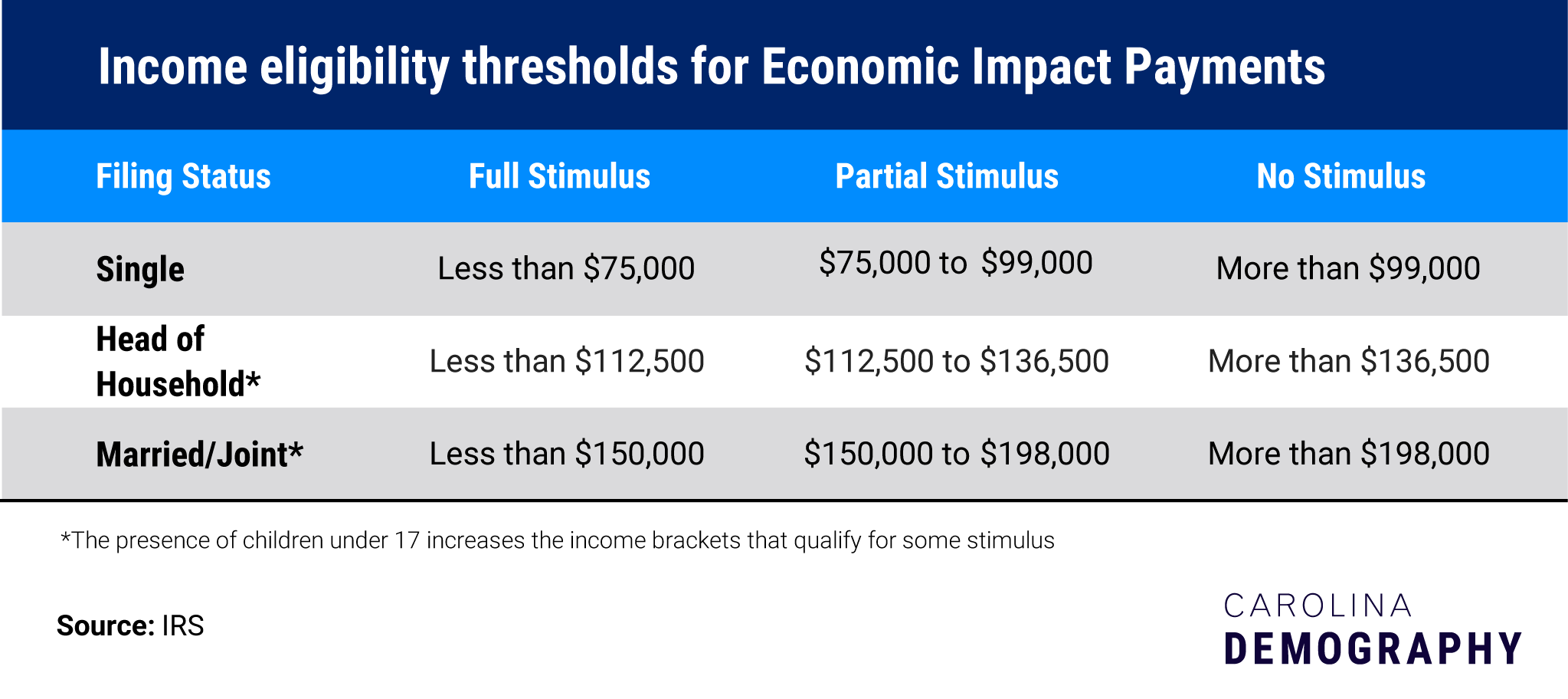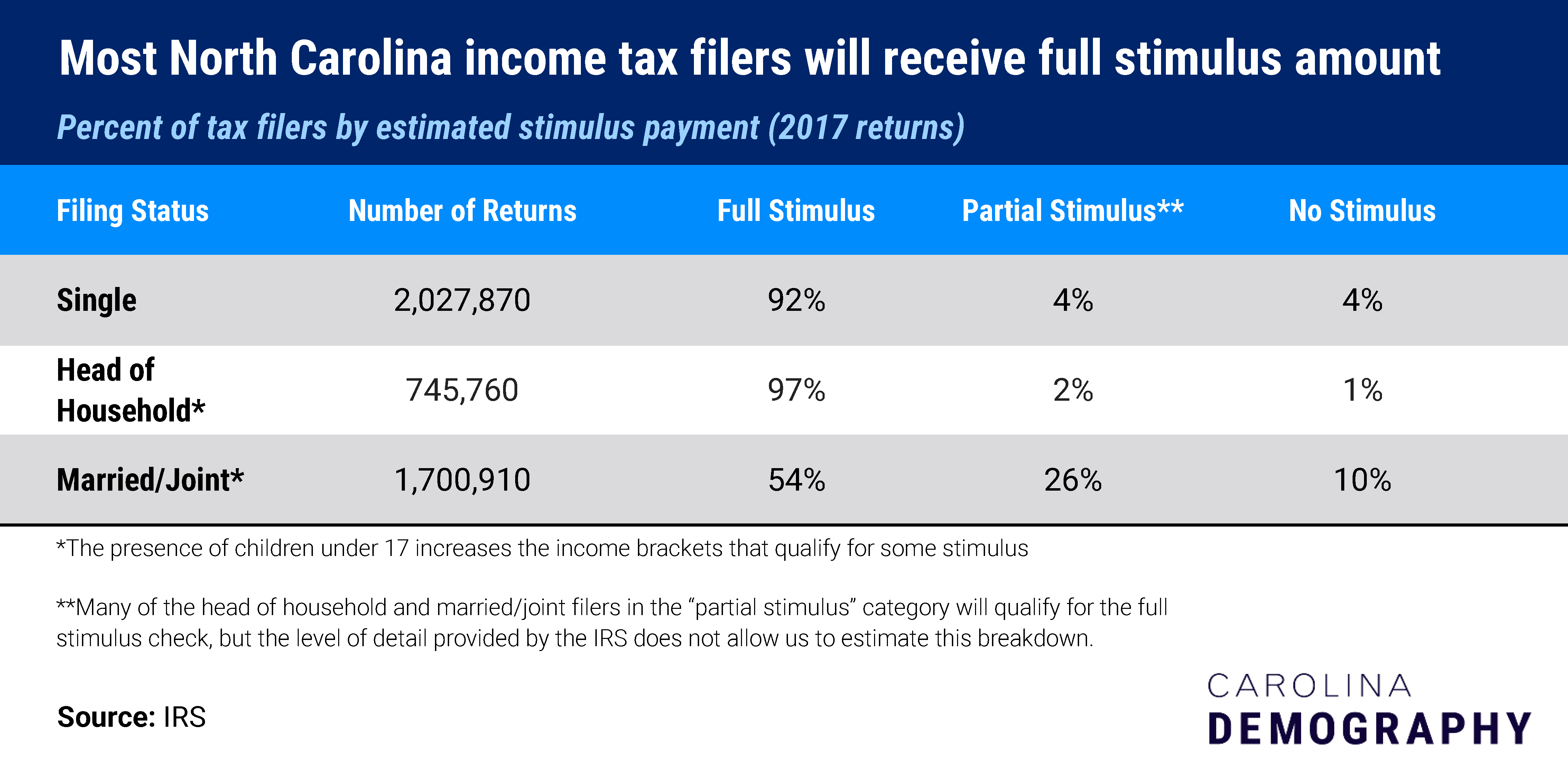How many North Carolina households might be eligible for federal stimulus checks?

April 15 would normally mark Tax Day, the federal income filing deadline. Due to the coronavirus pandemic, Tax Day is now extended three months to July 15. Instead, as the U.S. ends its first month of widespread social distancing, many American households may receive their federal stimulus check this week.
These stimulus checks – also known as Economic Impact Payments – will be as much as $1,200 per person, but not everyone will qualify. I am not a tax expert, so this is not the article to read if you want to know if you will qualify for one of these stimulus checks. (This calculator from the Washington Post might help.)
But, as a demographer who concentrates on North Carolina, I was curious:
How many North Carolina households might be eligible for these payments? To estimate this, I downloaded 2017 individual income and tax data for North Carolina from the IRS.
Who gets economic stimulus checks?
First, a short explanation of how these economic stimulus checks are set up: The Economic Impact Payments distributed by the IRS have maximum income thresholds based on tax filing status. If an individual has an adjusted gross income (AGI) less than this amount, they automatically qualify for the full stimulus. The amount of stimulus provided decreases as income rises above these thresholds until it phases out entirely for higher-income individuals and households.

How many tax returns were filed in NC in 2017?
The IRS reported nearly 4.6 million tax returns filed in North Carolina in 2017:
Another 103,000 or about 2% were some other return status, such as qualified widow.
How many of these NC filers would qualify for the economic stimulus checks?
Based on 2017 tax return data, most North Carolina single tax filers will qualify for the full amount: nearly 1.9 million or 92% of single filers had an AGI below $75,000 in 2017; another 4% had AGIs between $75,000 and $99,999, suggesting partial stimulus. Just over 4% of single tax filers in North Carolina in 2017 would have Adjusted Gross Incomes too high to receive any economic stimulus.

Nearly all of North Carolina’s “Head of Household” return filers—primarily single parents—would qualify for the full stimulus amount based on the income distribution in 2017 returns: 97% of Head of Household filers had an AGI under $100,000. Another 2% had an AGI between $100,000 and $199,999, which means a portion would qualify for the full stimulus (up to $112,500) and others would qualify for the partial stimulus.

While married or joint filing households have higher Adjusted Gross Incomes – reflecting two incomes, not just one – many of these households also qualify for the full stimulus amount. In 2017, more than half (54%) of joint filers had an AGI less than $100,000. Another 26% had an Adjusted Gross Income between $100K and $200K; most of these individuals would receive either a full or partial stimulus. Just 10% of joint filing households had an AGI above $200,000, making their earnings too high for any stimulus, though households above this threshold may still receive some stimulus if they have dependent children.
Need help understanding population change and its impacts on your community or business? Carolina Demography offers demographic research tailored to your needs.
Contact us today for a free initial consultation.
Contact UsCategories: Economic Data, NC in Focus

The Center for Women’s Health Research (CWHR) at the University of North Carolina School of Medicine released the 12th edition of our North Carolina Women’s Health Report Card on May 9, 2022. This document is a progress report on the…

Dr. Krista Perreira is a health economist who studies disparities in health, education, and economic well-being. In collaboration with the Urban Institute, she recently co-led a study funded by the Kate B. Reynolds Foundation to study barriers to access to…

Our material helped the NC Local News Lab Fund better understand and then prioritize their funding to better serve existing and future grant recipients in North Carolina. The North Carolina Local News Lab Fund was established in 2017 to strengthen…
Your support is critical to our mission of measuring, understanding, and predicting population change and its impact. Donate to Carolina Demography today.